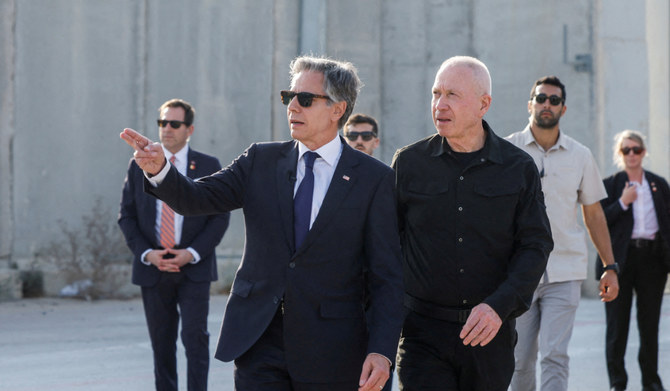WASHINGTON: US Secretary of State Antony Blinken on Monday pressed Israeli Defense Minister Yoav Gallant on the need for Israel to swiftly develop a robust post-war plan for Gaza and ensure the tensions with Hezbollah on Israel’s northern border do not escalate further.
“He (Blinken) updated Minister Gallant on ongoing diplomatic efforts to advance security, governance, and reconstruction in Gaza during a post-conflict period and emphasized the importance of that work to Israel’s security,” a State Department statement following the meeting said.
Washington has repeatedly urged Israel to craft a realistic post-war plan for Gaza and warned that the absence of it could trigger lawlessness and chaos as well as a comeback by Hamas in the Palestinian territory. Palestinians have previously said only an end to Israeli occupation and the creation of a Palestinian state will bring peace.
“He also underscored the importance of avoiding further escalation of the conflict and reaching a diplomatic resolution that allows both Israeli and Lebanese families to return to their homes,” the State Department added.
The Middle East remains on edge as Israeli Prime Minister Benjamin Netanyahu said on Sunday that a coming end to the intense phase of fighting in Gaza would allow Israel to deploy more forces along the northern border with Lebanon.
Earlier in June, Hezbollah targeted Israeli towns and military sites with the largest volleys of rockets and drones in the hostilities so far, after an Israeli strike killed the most senior Hezbollah commander yet.
Gallant has been on a trip to Washington, D.C., and has also met Amos Hochstein and Brett McGurk, top aides to President Joe Biden, as well as CIA Director Bill Burns. He is set to meet with Defense Secretary Lloyd Austin on Tuesday.
A small group of protesters chanted slogans while holding a Palestinian flag as Gallant, for whom the International Criminal Court prosecutor Karim Khan is seeking an arrest warrant, entered the Department building.
The Israeli minister described his meetings in Washington, including the one with Blinken, as “critical,” according to comments released by his office.
“The meetings we are holding are extremely important and impactful on the future of the war in Gaza and our ability to achieve the goals of the war, on developments on the northern border, and other areas,” Gallant said.
Earlier at a news briefing, State Department spokesperson Matthew Miller told reporters Washington hoped to make progress in its talks with Gallant, although said there was still no agreement with Israel on a post-war Gaza plan even as Israel was getting close to ending major combat operations in Rafah.
“We have been quite consistent that for there to be an enduring defeat of Hamas, there needs to be a plan for what replaces them and what replaces that needs to be Palestinian-led governance, needs to be realistic security plans,” Miller said.
“We do not want to see them reoccupy Gaza, which is why we continue to push for an alternative to that,” Miller said.
Hamas came to power in Gaza in 2006 after Israeli soldiers and settlers withdrew in 2005, but the enclave is still deemed as Israeli-occupied territory by the United Nations. Israel controls access to Gaza. Hamas has been gaining popularity among Palestinians in the West Bank and Gaza Strip in recent months.
The war started when Palestinian Hamas militants burst over the border and attacked Israel on Oct. 7, killing 1,200 people and taking 250 others hostage, according to Israeli tallies.
The Israeli offensive in retaliation has killed almost 37,600 people, according to Palestinian health authorities, and has left Gaza in ruins.
























